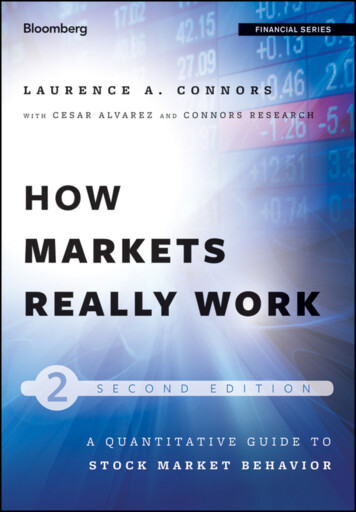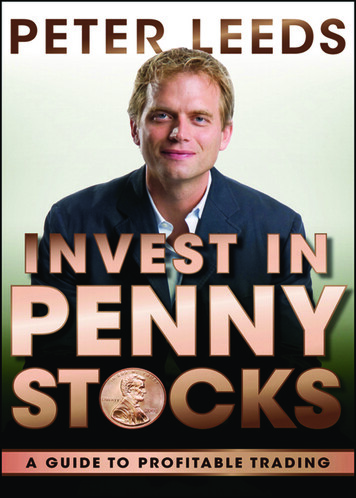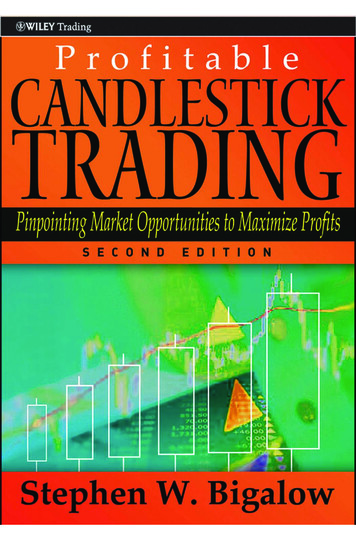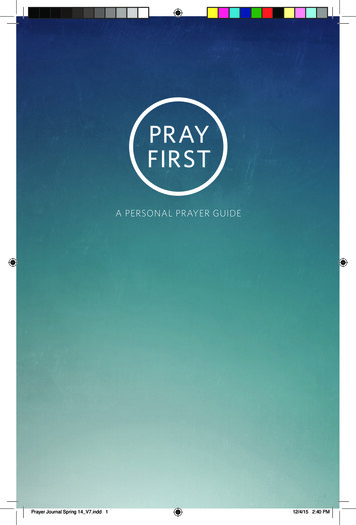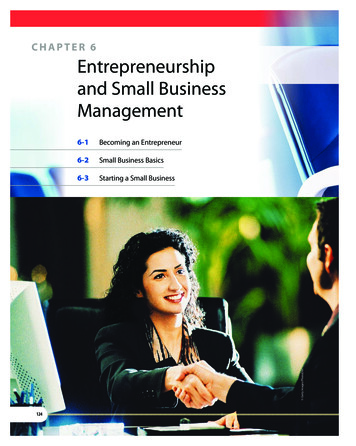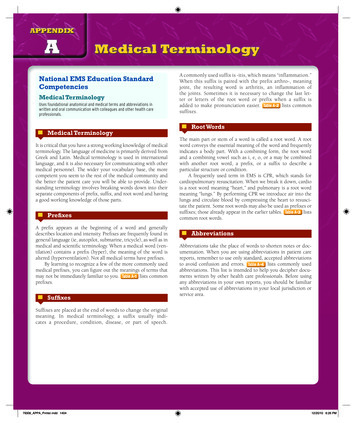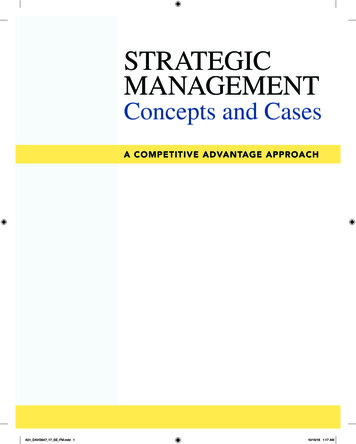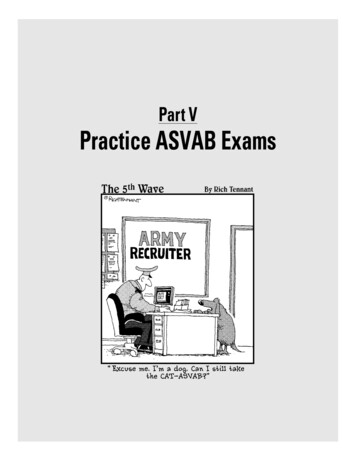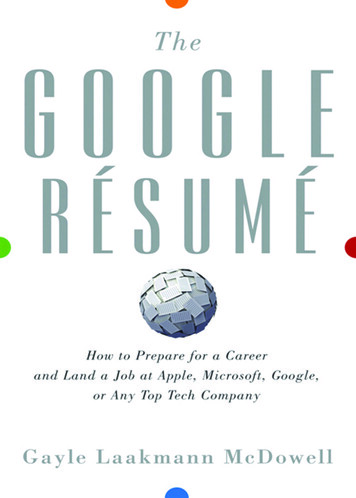
Transcription
ffirs.indd ii1/6/11 6:49:56 AM
ffirs.indd i1/6/11 6:49:55 AM
ffirs.indd ii1/6/11 6:49:56 AM
How to Prepare for a Careerand Land a Job at Apple, Microsoft, Google,or any Top Tech CompanyGayle Laakmann McDowellJohn Wiley & Sons, Inc.ffirs.indd iii1/6/11 6:49:56 AM
Copyright 2011 by Gayle Laakmann. All rights reserved.Published by John Wiley & Sons, Inc., Hoboken, New Jersey.Published simultaneously in Canada.No part of this publication may be reproduced, stored in a retrieval system, or transmittedin any form or by any means, electronic, mechanical, photocopying, recording, scanning,or otherwise, except as permitted under Section 107 or 108 of the 1976 UnitedStates Copyright Act, without either the prior written permission of the Publisher, orauthorization through payment of the appropriate per-copy fee to the Copyright ClearanceCenter, Inc., 222 Rosewood Drive, Danvers, MA 01923, (978) 750-8400, fax (978)646-8600, or on the web at www.copyright.com. Requests to the Publisher for permissionshould be addressed to the Permissions Department, John Wiley & Sons, Inc.,111 River Street, Hoboken, NJ 07030, (201) 748-6011, fax (201) 748-6008, or onlineat http://www.wiley.com/go/permissions.Limit of Liability/Disclaimer of Warranty: While the publisher and author have used theirbest efforts in preparing this book, they make no representations or warranties with respectto the accuracy or completeness of the contents of this book and specifically disclaim anyimplied warranties of merchantability or fitness for a particular purpose. No warranty maybe created or extended by sales representatives or written sales materials. The advice andstrategies contained herein may not be suitable for your situation. You should consult with aprofessional where appropriate. Neither the publisher nor author shall be liable for any lossof profit or any other commercial damages, including but not limited to special, incidental,consequential, or other damages.For general information on our other products and services or for technical support,please contact our Customer Care Department within the United States at (800) 762-2974,outside the United States at (317) 572-3993 or fax (317) 572-4002.Wiley also publishes its books in a variety of electronic formats. Some content that appearsin print may not be available in electronic books. For more information about Wileyproducts, visit our web site at www.wiley.com.Library of Congress Cataloging-in-Publication Data:McDowell, Gayle Laakmann, 1982The google résumé : how to prepare for a career and land a job at Apple, Microsoft,Google, or any top tech company / Gayle Laakmann McDowell.p. cm.Includes index.ISBN 978-0-470-92762-5 (hardback)ISBN 978-1-118-01313-7 (ebk)ISBN 978-1-118-01314-4 (ebk)ISBN 978-1-118-01315-1 (ebk)1. Résumés (Employment) 2. High technology industries—Vocational guidance.3. Job hunting. I. Title.HF5383.M335 2011650.14'2 — dc222010039906Printed in the United States of America10 9 8 7 6 5 4 3 2 1ffirs.indd iv1/6/11 6:49:57 AM
To my mother and grandmother,whose engineering endeavors paved the way for my own.ffirs.indd v1/6/11 6:49:57 AM
ffirs.indd vi1/6/11 6:49:57 AM
ContentsChapter 1IntroductionChapter 2Advanced Preparation15Chapter 3Getting in the Door36Chapter 4Résumés57Chapter 5Deconstructing the Résumé78Chapter 6Cover Letters and References89Chapter 7Interview Prep and Overview108Chapter 8Interview Questions137Chapter 9The Programming Interview163Chapter 10Getting into Gaming190Chapter 11The Offer207Chapter 12On the Job230Chapter 13Final Thoughts: Luck, Determination,and What You Can Do258156 Action Words to MakeYour Résumé Jump261Answers to Behavioral Interview Questions265Appendix AAppendix B1Index273viiTOC.indd vii1/6/11 6:57:14 AM
TOC.indd viii1/6/11 6:57:14 AM
Chapter 1IntroductionJust so you’re clear: it was not my idea to give a talk to MicrosoftResearch. I had learned embarrassingly little about computer sciencein my 18 years of life, and the last thing I wanted to do is to havethat exposed in front of a bunch of genius PhDs in MSR. But mymanager thought it’d be a great “opportunity,” and so there I was,blabbing on about my summer project.I finished up my talk at lightning speed. As I was dealing with asomewhat severe case of stage fright, I considered my haste a goodthing. And then the questions started. Did I consider doing X? Yes,I told them, I did, and this is what happened. Why not implement itwith Y? You could, but that would cause problem Z.I almost hesitated to admit it to myself afterwards, but thingswent fine. Just fine.That whole summer I had been convinced that Microsoft woulddiscover that I knew practically nothing and cut me loose. I had onlygotten my internship offer through some brilliant streak of luck,I reasoned, and didn’t really deserve it. Not like my fellow internsdid anyway. They had done three times as much college as me, completed three times as many projects, and basically knew three timesas much as me.1CH001.indd 11/6/11 6:48:54 AM
2The Google RésuméFour years later, with a job at Google about to start, I reflected onmy incredible luck. I landed a Microsoft internship at an incrediblyyoung age, and that turned into three consecutive internships. ThenI got an Apple internship, even though Apple never even recruited atmy university. And then I happened to get hooked up with just theright people who referred me to the up-and-coming Google. I mustbe the luckiest person alive.Or am I?Maybe, while Lady Luck was certainly in my favor, I had somehow, accidentally, done everything just right. I completed severallarge projects in high school, offering me considerably more experience than my peers. I got an entry-level job as a web designer,which developed my professional and technical credibility. I createda résumé that, while atrocious in many respects, demonstrated mypassion for technology and showcased my limited experience. Andfinally, I built a network of more senior professionals, managed relationships with mentors, and leveraged these connections to land onedream job after another.And that, my dear readers, is how you get a job at the world’sgreatest tech companies.Life at Infinite Loop and Microsoft WayEven their addresses are suggestive of company stereotypes.Microsoft, at One Microsoft Way, screams big and mammoth.Google’s 1600 Amphitheatre Parkway address is understated, likeits user interfaces. Apple, of course, takes the bold “think different”step with One Infinite Loop—a play on words that could comeback to bite a less beloved company.YouthfulDespite the little eccentricities of each company, these companiesare much more alike than they are different. Software companies areCH001.indd 21/6/11 6:48:54 AM
Introduction3youthful— at heart, if not in actuality. They scorn the stuffysuits-and-ties atmosphere of their predecessors and elect to wearjust jeans and a T-shirt. In fact, this casual attitude is so potent thatit’s pervaded even the social scenes of tech hubs; only a small handfulof restaurants in Seattle and San Francisco would request anythingbeyond jeans, and a woman in a suit gets more stares than a girl witha purple mohawk.PerksDesperate to attract and retain the best and the brightest, tech firmsshower their employees with perks. Microsoft offers free drinks,a heavily discounted gym membership, and an all-expenses-paidhealth care plan. Google matched and then one-upped Microsofton almost all of these. Free sodas? Try free breakfast, lunch, and dinner. Free gym membership? Use the on-site gym and pool. Deluxehealth care plan? We’ll give you a good one, and throw in an on-sitedoctor. Nerds everywhere can only hope that the “next Google,”whatever it is, will engage in its own perk war.Of course, cynics argue that these benefits are really just a wayto trick employees into staying at the office longer. You can fulfillalmost any regular appointment, from a haircut to dry cleaning,without leaving campus. But the fact that you can doesn’t mean youhave to. No one will think worse of you because you declined toget your dental work done from the on-site dentist parked in thevan out back.Work/Life BalanceThe severe shortage of engineers in the United States forces companies to take good care of their employees. They would lose toomany qualified candidates otherwise.Workers are encouraged to find a reasonable work/life balance,and work comparatively short hours compared to people from otherindustries.CH001.indd 31/6/11 6:48:55 AM
4The Google RésuméThe exception, as in most jobs, is during crunch times. Softwarereleases will be stressful in any team.Moving Up: Individual ContributorsAlthough other industries push high-performing employees intomanagement roles, technology companies tend to be more open tothe “individual contributor” role. After all, great engineers do notnecessarily make the best managers.An employee, particularly in engineering, can continue to get promotions and increased technical responsibilities, without becoming apeople manager. Eventually, this employee can grow into an architector a distinguished engineer, earning one of the most respected positions within the company. It’s perhaps not as glamorous as being a VP,but for some people, this is just right.The DifferencesCultural differences between companies can often be traced back tothe company’s roots.Amazon, many would argue, is more of a retail company than asoftware company. It faced extremely hard times during the dot-comcrash, and continues to battle profit margins that are levels of magnitude lower than that of a “core” software company. It is consequentlyextremely frugal, and refrains from providing the lavish perks thatothers software companies might. Additionally, some employees havesuggested that the company does not value technical innovation forits own sake, and instead looks for an immediate and causal link toprofits. But, do not let that deter you too much; indeed, Amazon isleading in multiple industries (retail, cloud computing, etc.) largelybecause of its technical innovation. The company moves at a rapidpace and pending deadlines often mean late nights.Apple is just as secretive inside as it is outside. When your innovation lies so heavily in your look and feel and your market share dependson beautifully orchestrated hype, it’s no wonder. The company can’tCH001.indd 41/6/11 6:48:55 AM
Introduction5afford to let its secrets slip. Employees are die-hard fans, just as onewould expect, but rarely know what coworkers from other teamsare working on. In my time at the company, I sensed a feared-butrevered attitude toward Steve Jobs; he called the shots, and no onewould argue.Microsoft has dabbled (and reasonably successfully) with searchand the web, but a large chunk of its earnings come from Windows andOffice. Live patches to these products are expensive, so the companytends to operate on longer, multiyear release schedules. This meansmoving slower, taking fewer risks, and making sure to get everythingright the first time (even if it’s never totally right). The bright side isthat the company tends to have a good work/life balance, as ship datesare relatively infrequent. Many former employees say that though theyloved the company, its mammoth size could stifle innovation and risktaking. However, individual team cultures are all over the map, andsome may be more innovative than others.Google is the nerdiest of the nerdy. Founded by two formerStanford PhDs, the company is still, many claim, preferential to engineers over other positions. The company moves quickly, shippingproducts weekly, and can value technical innovation even to a fault.As a web-based company, it can afford to take some risks on products; after all, “shipping” a new application to the web is so mucheasier than boxing up and mailing software. Google values its flathierarchy, but there’s a downside as well. Your manager may have toomany people under her to fuss about the progress of your career, andmoving up can be a challenge.Big vs. Little: Is a Start-up Right for You?Go to almost any business school and you’ll find that there are aboutthree times as many people who claim to be “interested” in startups than actually pursuing this career path. Why? Because start-upsare sexy.CH001.indd 51/6/11 6:48:55 AM
6The Google RésuméNewspapers splash stories about start-ups that made it big, orcrashed and burned, and we always think, we can do that or we can dobetter. Start-ups are a high-stakes game, and you’re gambling withyour time as well as your money.For the right person with the right opportunity, however, astart-up environment can be fantastic.The GoodMany say that for true “start-up people,” this high-risk career is justin their nature. They get that entrepreneurial itch, either in collegeor at some big company, and know they need to be somewheremuch, much smaller. And their new career path offers a ton of valueto them in return: CH001.indd 6Diversity of skills. Whereas big companies have designatedmarketing and finance people, start-ups never have enoughpeople to fill every role. And the smaller the company, the morehats you have to wear. Unless you are truly narrowly focusedon just one field (in which case you should avoid start-ups), thiscan be a great thing. You’ll get to develop a more diverse skillset, which will help you in your future job search.Leadership opportunities. When— or if—your start-upgrows, you’ll be in a great place to lead your own team. Manypeople join a company and find that within months they’reexpected to manage several new hires. You’d have to be at abigger company for years to get such an opportunity.Control and influence. Each time a bit of my work shippedat a big company, I was able to point to it and say, “I didthat.” And while that made me happy, a little part of me alsoknew that, really, someone else would have come along anddone something very similar if I hadn’t been there. At a startup, however, you are not only shaping the company in howyou perform your immediate responsibilities, but you’re also1/6/11 6:48:55 AM
Introduction 7offering feedback on all aspects of the business. Think thenewsletter should have some content about related tools andplug-ins? It’s your job to speak up, and everyone will listen.You always know the decision makers in any department.Rapid results. You won’t have to wait years to see your workout in the real world; it’ll happen within months. That holdstrue for any decisions you make as well. For better or worse,the outcome is visible within months, enabling you to learnfrom your mistakes (and successes) much faster.High reward. Hey, we don’t take on all this risk for nothing.Start-ups can make you very, very rich if you get very lucky.Of course, it could just as well do absolutely nothing for youfinancially—and usually that’s the case.Me? I’m a start-up person. I love everything about it. I love thatI get to do 10 things at once. And if I have no idea how to do it,then I get to learn. I see my impact immediately and I know that,for better or worse, I shaped the company’s future.The BadStart-up burnout is a very real thing. Sure, you may be passionateabout your new social-location-group-buying-thingy-dot-com, butthings change and passions die. The following stresses tend to wearon people the most. CH001.indd 7Long hours. With the amount of money and careers depending on a start-up’s success, long hours are critical. Those whodo the bare minimum don’t last long, and start-ups do not havethe fear of firing underperformers that bigger companies do.Unclear job description. You were hired in to be a tester,and now you’re helping look for office space. Well, tough.Someone’s got to do it. Start-ups don’t have the time and moneyto hire a specialist for each and every task, so employees are1/6/11 6:48:56 AM
8The Google Résumé expected to chip in on projects that are outside of their roles.That may mean you spend less time doing what you love andmore time doing what the company wants you to do.Low pay. With very few exceptions, start-ups tend to paybelow-industry salary and compensate for the difference withstock options. If the company fails (which it usually does),your stock options are worth nothing.Limited credibility. The earliest employees of Google andFacebook have lots of credibility, but let’s face it—what are theodds? You may join a start-up, only to have it fail after a fewyears. And all of a sudden you’re back on the job market withsome no-name company on your résumé that wasn’t goodenough to survive. Doesn’t sound so appealing, does it?Less mentorship. Big companies have invested time andmoney in understanding how to train new employees; startups lack both of those things. They probably won’t invest ingrowing you into a great leader in three years because they’llbe lucky if they make it that long. Big companies can teachyou a structured way of solving problems, under the guidanceof more experienced professionals, while those at start-ups arelearning on the go. And if your coworkers have never spenttime at a big company, they may have never been taught how“real” companies do things.Notice anything missing in that list? I never listed the lack ofperks. The reality is that as much as people are drawn to companieslike Google and Microsoft for their flashy benefits, even ex-employeestend not to miss them much once they’re gone. Having to scrimp andsave due to your meager salary may frustrate you, but a lack of freefood tends not to be an issue.The UglyIn Ryan’s first four years after leaving Amazon for the start-up scene,he’d worked for four different companies. He left one companyCH001.indd 81/6/11 6:48:56 AM
Introduction9because of a personality mismatch between him and the CEO.Words were exchanged. It wasn’t pretty. The next start-up folded.The third one started to veer in the wrong direction, and he decidedto get out before it was too late. Lucky number four is a companyhe started himself.Ryan’s story is fairly typical of start-up employees. With fewerthan 40 percent of tech start-ups making it past four years, rapidjob switching is just a fact of life. People joining start-ups should bementally prepared for this constant change.The silver lining here is that because your coworkers will haveworked at so many places, you’ll also be tapped into a broad networkof people. It doesn’t take long to build the connections to wiggleyour way in front of any start-up recruiter.The Job Title: What Do You Want to BeWhen You Grow Up?As a kid, everyone used to ask me, “What do you want to be whenyou grow up?” Some kids change their answer every few weeks,but not me. I knew I wanted to be a veterinarian because thenI could play with puppies all day. I was fairly certain that was, in fact,their entire job. After an unfortunate incident involving my dog and aneighbor’s car, I learned that vets also sometimes killed dogs— or, touse their delightful euphemism, “put them to sleep.” I decided that,although I would clearly get to play with puppies the rest of the time,it didn’t quite make up for the whole dog-murder aspect. So, there Iwas, yet another 10-year-old with an undecided career path.At age 14, I decided to enroll in a programming class. (“Decided”is my own personal euphemism for an argument with my mother thatwent something like “but programming is stupid,” followed by hersaying “too bad.”) Four years later, this was my ticket into Microsoft,and eventually into Apple and Google.Few, especially outside of engineering roles, have this sort offocus; that’s OK. Talk to people, research positions, and start figuringCH001.indd 91/6/11 6:48:56 AM
10The Google Résuméout what’s important to you. Ask yourself the following questions tostart understanding what career path makes sense.What Do You Need?Our society contradicts itself every day. On one hand, we are toldover and over again, “money doesn’t buy happiness,” and we havethe disastrous lives of celebrities to drill this into us. On the otherhand, we’re also told that we really do need that new jacket. Let goof what you think should matter, and be honest with yourself. Howmuch do the following matter to you? Money. Money may not buy happiness, but it does buy yourkid’s college tuition. And a house in a nice neighborhood.Or maybe just a nice bottle of wine after a hard week. Doesthat matter to you? Be careful with looking too heavily atmoney. While you can be fairly confident that your teachingdream will never bring in the big bucks, you can’t be as certain about many other career paths. Passionate, driven peoplecan earn a good living in unexpected ways.Recognition and respect. Many people who shun thespotlight still desperately crave the admiration of their fellowpeople. How much do you care about what others think ofyou? Would you be OK with people giving just a courtesysmile when you say your profession?Work/Life balance. There is nothing wrong with wantinga nice, stable, 9-to-5 (or in the tech world, 10-to-6) job. Youwant to be able to enjoy a nice day out on the boat duringthe summer, and that’s fine. Remember, no one went to theirgrave thinking, “Gee, I wish I had spent more time at theoffice instead of with my family.”If you find your answers learning away from a job for somereason, ask yourself why. Is there something you need from the jobthat you wouldn’t get?CH001.indd 101/6/11 6:48:57 AM
Introduction11How Do You Enjoy Working?I’ve always thought that, had I lived before computers were invented,I would have majored in architecture. The structure of the workseems similar to what I ended up doing: computer science. I couldlead. I would create something. And, while I would have supportingteammates, I’m not glued to someone’s side to complete a project.How do you enjoy working? Teamwork vs. independent work. Everyone loves to say,“Teamwork is the best!,” but deep down, you see the problems. Coworkers letting you down or just getting in theway. Needing a consensus just to make a decision. Managingeveryone’s emotions and expectations. Is this really somethingyou enjoy?Creating vs. maintaining. While software development iscreating a new product, testing is maintaining it. There are notangible results of your work; it’s more like pulling up the plugin a sink while the water’s still running. It’ll just keep comingand coming. How important is it to feel that you built something? Remember that even “maintenance” jobs (like being asurgeon) can have huge impacts on the world.Leading vs. joining. Leading is great, but it’s the joiners whoget their hands dirty. Do you want to lead, with all the joys andresponsibilities that come from that? Or would you rather relaxa bit more and join someone else to accomplish a task?What Are You Good At?Even if you don’t know what field you want to go into, you probablyhave an instinct as to what your skill set is. Which of the followingare your strengths? CH001.indd 11Numbers. Numbers come more easily to some than to others.Are you the kind of person who can understand real-worldword problems and whip up a spreadsheet to demonstrate?1/6/11 6:48:57 AM
12The Google Résumé Writing and communication. Don’t worry about proseand poetry; it’s rarely relevant to the professional world. It’smore important to be able to communicate effectively, bothin speaking and in writing.Creativity. Creativity stretches beyond artistic skills; it’s alsoabout how you solve problems. When faced with an issueof releasing a software product in China, can you brainstorm other revenue streams to dodge the nearly 100 percentpiracy rate?People skills. Being good with people is more than justbeing likable (though that’s certainly part of it). It’s alsoabout reading people, knowing how to encourage them, andknowing when you might be pushing them too hard. Thosewho are especially good with people may find themselveswell suited for management positions.Most people’s college majors have little to do with their eventualcareer path, so don’t feel constrained by your major. Your skill setis so much more than your raw factual knowledge. Analyze yoursuccess and failures. Think through actual projects or jobs whereyou’ve been particularly happy or unhappy. What was it that madethe difference? The answers to these questions will help point youin the right direction.And You’re on Your Way . . .On my last day at Google, I packed up my final belongings in asingle box and was reminded of everything that’s great about techcompanies.The Pranks. My teammates had decorated every inch of my deskwith pink tissue paper. Even the bottle caps, which we used to pelteach other with, were individually wrapped. Rather than leavinga gap in the tissue paper for my monitor screen, they had taped up aCH001.indd 121/6/11 6:48:57 AM
Introduction13printout of my Facebook page— only they had replaced my smilingface with a Photoshopped picture of me in a princess dress. Withwings. They must have spent hours doing this, but no one wouldhave batted an eye. This sort of prank is normal for the cultures ofmost tech companies.The Fun. No one batted an eye, either, at having a few cocktailsto celebrate my last day. I lined up a drink shaker, a few flavors ofAbsolut, and mixers that were borrowed from the company fridge. Ibegan taking orders. Just because it was my last day didn’t mean thatI was not going to contribute some good, honest work.The Impact. I spent my final day (pre-cocktails, of course) preparing a document about my work to facilitate someone else takingover my responsibilities. I explained the current progress, challenges, and the relationship with our external partners. I knew thatI had contributed tangible value to the team, and to the company.One day, our I’d-tell-you-but-I’d-have-to-kill-you product wouldlaunch, and I couldn’t wait for that day to come.The Network. People stopped by regularly to wish me well andask me what I was off to next. The truth is, other than a vacation toCosta Rica, I didn’t know. I wanted to set aside some time to travel,something that I didn’t get the chance to do after college, and thenI would look for opportunities at start-ups. They said to keep intouch, and they meant it. A few suggested that they, too, were considering leaving and wanted me to let them know what I was up to.Hint, hint?As much I enjoyed my experience at Google, and at Microsoftand Apple, I knew that I’d never return to a big company. Theyhad helped grow me as an engineer and as a businessperson, and hadgiven me the credibility to work almost anywhere, but I knew thatI belonged at a smaller company. I bade them all farewell, and wenton my way.Never failing to have the last word, though, my teammates leftme with a final remainder of my days with them. They snuck anCH001.indd 131/6/11 6:48:57 AM
14The Google Résuméannoyatron—a tiny device that emits beeps at random for the solepurpose of driving someone crazy—into my car. I drove for monthsunsure of what the beeps meant and if my car was on the verge ofbreaking down. Finally, I found the gadget affixed to the undersideof my seat, and recognized it immediately. I had started the Battle ofthe Annoyatrons months earlier, and they had ended with a simpleact on my final day. Touché, team, touché.CH001.indd 141/6/11 6:48:58 AM
Chapter 2AdvancedPreparationI didn’t mind answering the same questions for hours on end.And I didn’t mind the fact that I never even got a chance to eatlunch because the line to talk to me was so long. What really buggedme about representing Google at career fairs were the chemicalengineering majors.I know, that’s unfair. There were others like them: bioengineering, material science, physics, and so on. A quick glance at their résuméwould reveal nothing for which they were especially well suited.Sometimes I wanted to ask them, Is there any reason you’re talking to meother than “Oh-my-god it’s Google”? Why technology? Why you?But I wouldn’t. Instead, I’d politely smile and offer a cannedresponse of, “I’m not sure what the best match would be for yourbackground at this time, but we’ll keep your résumé on file in caseanything comes up.” This is kind of like telling someone you meetat a bar, “How about I get your number, and I’ll call you instead?”I’ve used both techniques, and let me tell you, they work great!It’s not that you can’t find a role for a chemical engineer, butuntil Google starts its own chemistry lab (and I’m not holding15CH002.indd 151/6/11 6:55:21 AM
16The Google Résumémy breath), a chemical engineering degree alone probably won’t beyour ticket into the company. The eager chemical engineer— orEnglish literature major—needs to find other avenues to prove thatthey have what it takes to be a “Noogler.”What Can You Do: An OverviewRecruiters want to know two things when they pick up yourrésumé: Where would you fit at our company? And would youdo a good job? If a recruiter can’t identify answers to those twothings, then your résumé goes in the trash pile. Your goal, therefore, is to get the experiences and background that will answerthose questions: CH002.indd 16Develop a track record of achievement. Recruiters wantto see that you have a pattern of setting ambitious goals andaccomplishing them. Your successes could be in academics,project work, volunteer work, employment, or athletics.Learn to write and speak. Communication, whetherwritten or oral, is vitally important to your career success.If you aren’t comfortable with public speaking, get practicewith it. If your writing is weak, take a writing course, or starta blog to get more practice. You don’t need to be able to dodramatic readings or write elegant prose, but you do need tobe able to write in a way that is clean and professional.Emphasize depth over breadth. As a college student,I didn’t play sports or act or sing. I had two college activities—teaching and representing Microsoft on campus—andI poured everything I had into those. Because I put 200percent into those responsibilities rather than spreading myselfthin, I was able to
Appendix B Answers to Behavioral Interview Questions 265 Index 273 TTOC.indd viiOC.indd vii 11/6/11 6:57:14 AM/6/11 6:57:14 AM. TTOC.indd viiiOC.indd viii 11/6/11 6:57:14 AM/6/11 6:57:14 AM. 1 Chapter 1 Introduction Just so you're clear: it was not my idea to give a talk to Microsoft Research. I had learned embarrassingly little about .
